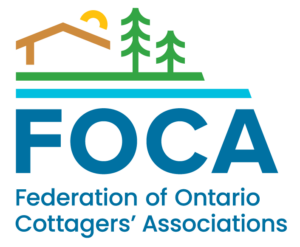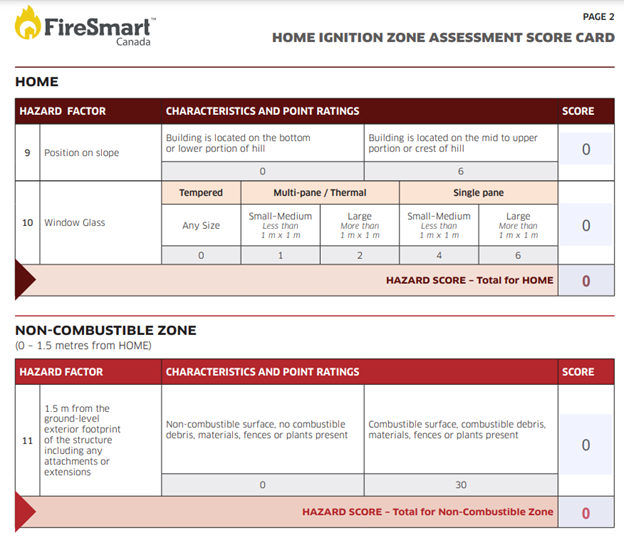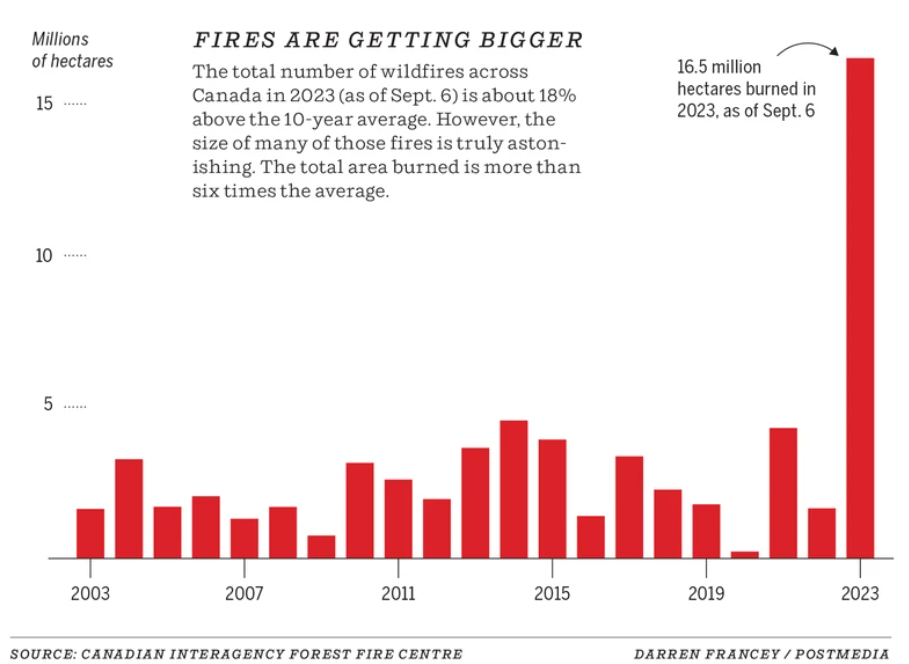
Forest fires are a fact of life in Ontario, and our members are among those who are potentially at risk from the threat of fire.
To Report a Wildfire:
Central and South Ontario– call 911 or your local municipal fire department
Northwestern Ontario – Call 310-FIRE (3473)
Northeastern Ontario – Call 310- FIRE (3473)
Access a map of current Ontario forest fire hazard levels across the country from the Canadian Wildland Fire Information System. This “Canadian Forest Fire Danger Rating” is a national system to rate the risk of forest fires, based on a variety of factors, such as ease of ignition and difficulty of control. (pictured: the Fire Map in May 2023)
The Province of Ontario posts general information about fire restrictions, here: https://www.ontario.ca/page/outdoor-fire-restrictions
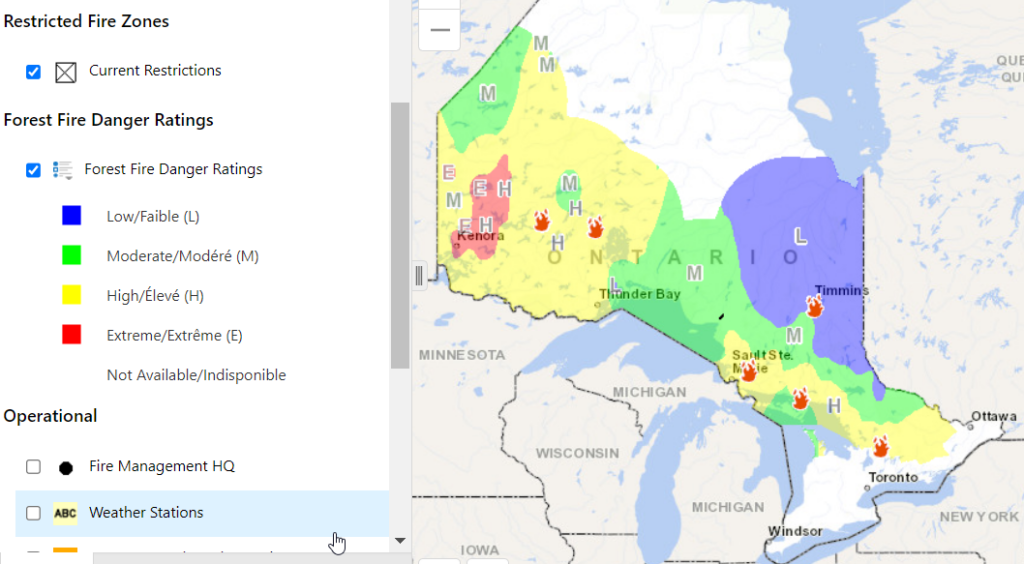
Municipalities post current fire danger ratings and fire restrictions during the fire season (April 1 to October 31 each year), and impose fines for failing to comply with local fire bans.
Get links to municipal websites from the Association of Municipalities of Ontario.
Track smoke trails across Ontario in real-time on the Fire Smoke Canada website.
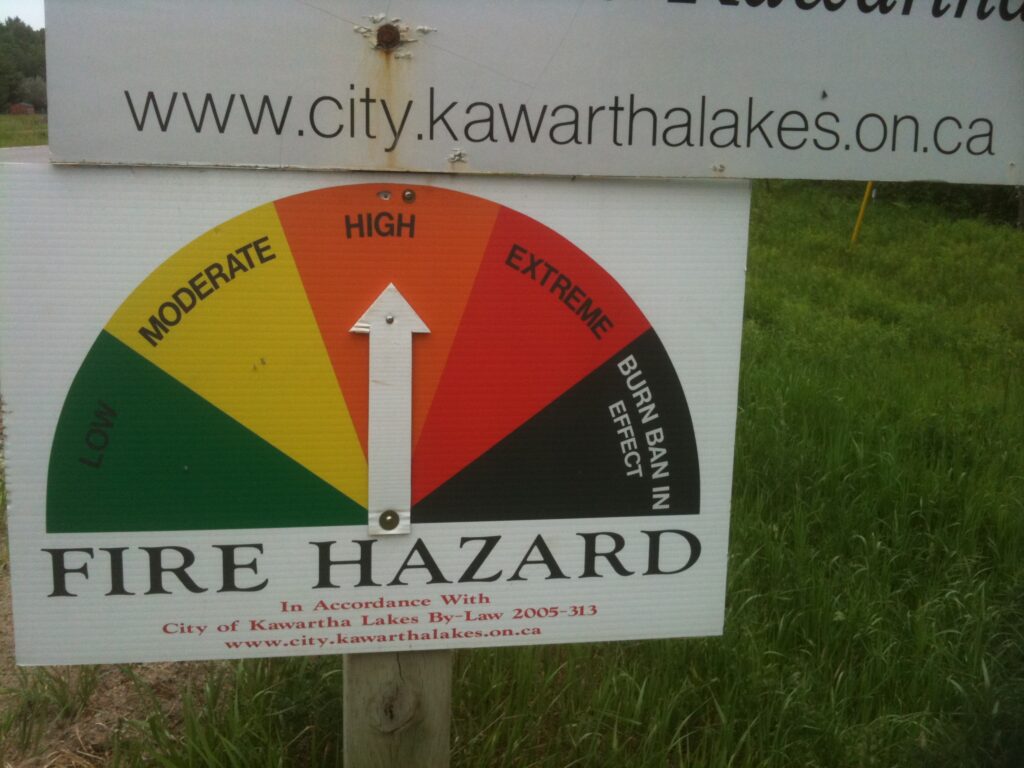

November 2024 – Ontario’s waterfront communities are cherished for their proximity to woodlands, but many face a growing wildfire risk. Managing this threat requires collective action from agencies, communities, and individual property owners. The Ontario Ministry of Natural Resources (MNR) plays a leading role in forest fire prevention and response. Collaborating with provincial agencies and the Canadian Interagency Forest Fire Centre, MNR supports programs like FireSmart, empowering communities and homeowners to reduce wildfire risks. (Learn more about FireSmart below.)
Recognizing the increasing wildfire threat, in November 2024, MNR introduced Bill 228, the proposed Resource Management and Safety Act, 2024. This Act modernizes wildfire management, replacing the outdated Forest Fires Prevention Act (1999) with the Wildland Fire Management Act and introducing key updates:
- Definition of Wildland Fire: expands to include fires in diverse vegetation types, such as grasslands, peatlands, and agricultural areas
- Municipal Wildland Fire Management Plans: requires fire-prone municipalities and specific organizations to create comprehensive fire management plans
- Enhanced Emergency Powers: empowers the Minister to declare wildfire emergency areas, set restricted fire zones, and extend the fire season year-round, if necessary
- Wildland Fire Officer Powers: authorizes officers to extinguish fires, enter private property, investigate wildfire causes, and issue fines for violations.
For more details on MNR’s wildfire management efforts, visit: Forest Fire Management.
Take Action to Protect Your Property:
Even with the measures above, as homeowners we play a role in reducing wildfire risks and keeping our families and properties safe. Simple steps, like clearing flammable debris and creating fire-defensible properties, can make a big difference. Check out this guide for exterior home tips: FireSmart Your Home.
Let’s all do our part to protect Ontario’s communities from wildfire. For more prevention tips, visit: How to Prevent Forest Fires.
EARLIER NEWS:
July-August 2024 – the Province of Ontario held a public comment period on plans to modernize wildland fire management including proposed changes to the Forest Fires Prevention Act and wildland fire program to strengthen community preparedness and response, and improve prevention and mitigation. According to the Province’s discussion paper on the topic, by 2040 Ontario is expected to experience an increase of nearly 50 percent in the wildland fire occurrences compared to numbers recorded prior to 1990. Read more here: https://ero.ontario.ca/notice/019-8756

June 9, 2024 – Northern Ontario mayor wants a better plan for forest fires (Sudbury.com) – Last February, Calvin Township (east of North Bay) passed a resolution calling on the federal government to create a national forest fire fighting strategy and provide more water bombers.
June 5, 2024 – New public alert system from Environment and Climate Change Canada (ECCC): Air Quality Conditions During Wildfire Events – in response to public feedback during last year’s wildfire events, the system will notify an Advisory when the Air Quality Health Index is above 10 for 3 or more hours during wildfire smoke events – considered a “very high-risk” level. Read the news release from ECCC.
May 2024 – FOCA held a FireSmart webinar, together with our fire safety partners at the Aviation Forest Fire and Emergency Services (AFFES) branch of the Ministry of Natural Resources & Forestry:
Memories of the 2023 fire season are still close at hand: a record-breaking 741 fires and 441,000 hectares of forests burned (almost three times the 10 year average!). However, there are may things you can do at your own rural property, to increase your property’s resilience to wildland fire. This 1 hour webinar with the forest fire experts includes top fire safety tips for your property. Download the slides (PDF, 6 MB) which include links to additional resources.
FOCA’s partners at AFFES encourage you to start with a simple home assessment, to begin the process of keeping your home safe from fire. Install the FireSmart Begins at Home application from the Apple App Store or Google Play, or download the FireSmart Home Assessment Score Card (source of the image at the side).
November 22, 2023 – read about “the Summer Canada Burned” — The wildfire season that shocked the world (Calgary Herald; source of the graph below – click the graph image to expand it).
For a seasonal summary, consult Ontario’s Forest Fire webpage, as well as an October 2023 CBC article outlining in five charts the record-breaking 2023 wildfire season that was.
Also read the ‘Fire Season‘ and ‘Flood & Wildfire-ready Property‘ articles in the 2023 Ontario Lake Stewards Magazine (download PDF, 32 pages).

Because Ontario’s cottage and camp owners are located in rural and often remote locations, by very definition we must be somewhat self-reliant. It is essential for woodland property owners to be proactive and prepared for fire emergencies, to learn about their property risks, and to take steps to make their families safer.
Review these videos from FOCA, about Spring Burning Safety tips (left) and detailed Campfire Safety tips (right):
Tips & Tools to be “FireSmart” at your property:
July 2023 – whether you live part-time or full-time in cottage country, check out the new FireSmart Home Ignition Zone Poster (PDF, 1 page). By taking simple actions around the cottage, you can significantly reduce the risk of wildland fires impacting structures on your property. Start in the ‘Immediate Zone’ and work out to the ‘Extended Zone’.
Download the FireSmart Begins at Home App (for Apple or Android) on your digital device, to walk you through a home and structure assessment.
Or, consult the FireSmart Begins at Home Guide (PDF, 21 pages).
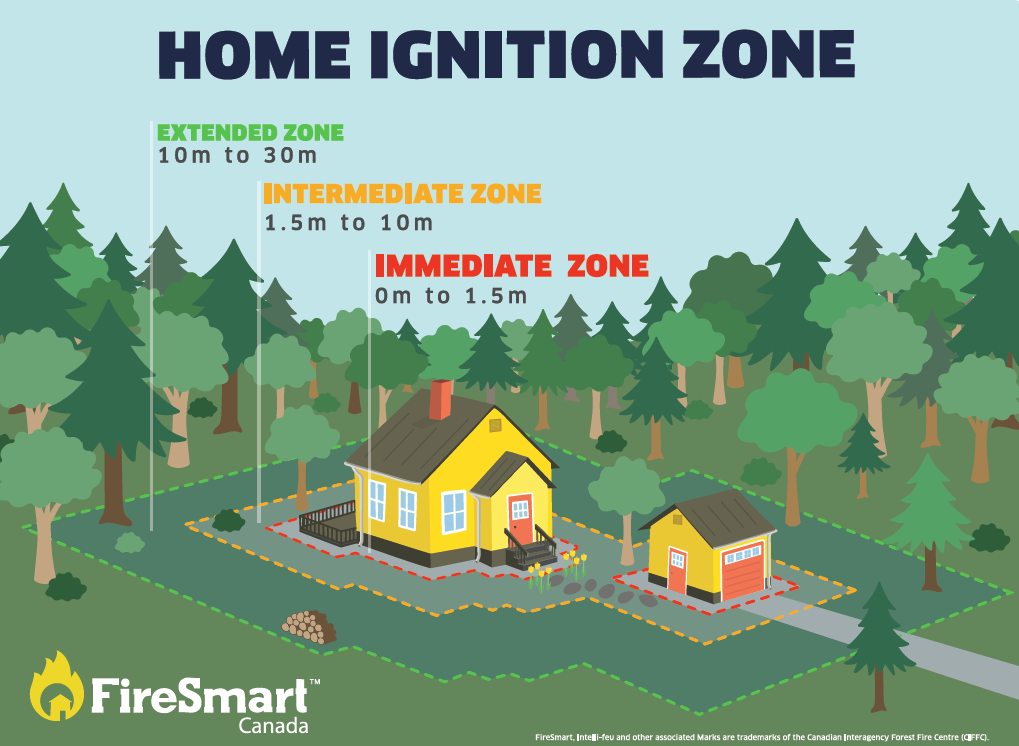
- for more resources & FireSmart info visit firesmartcanada.ca
- for Ontario wildland fire info & updates visit Ontario.ca/forestfire

Visit related FOCA webpages:
- Learn more about issues with fireworks and flying lanterns.
- Learn more about the dangers of carbon monoxide (CO) and the importance of CO and smoke detectors.
Also, plan ahead and take steps throughout the year to make differences in your property’s condition to help prevent the spread of wildfire. Protect your family. Protect your property. Prepare your community. 3-Steps-to-Wildfire-Protection Infographic spells out how to make your forest home a FireSmart home (Intact & FireSmart Canada)
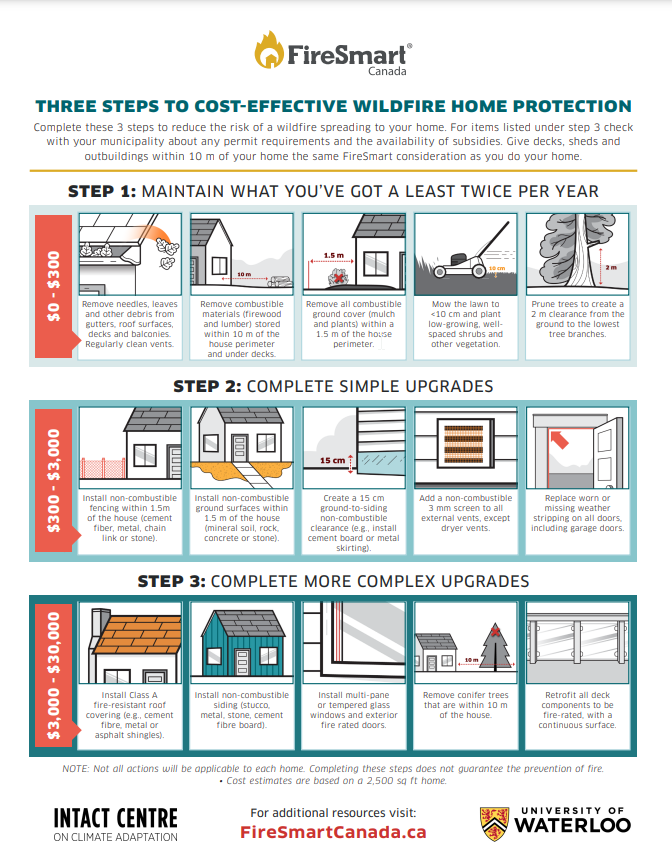
More Fire Safety Resources:
> download and share FOCA’s FireSmart Fact Sheet (PDF; 2 pages)
> download the Ontario “Home Owners FireSmart Manual” (PDF, 16 pages) with important safety information and a home hazard assessment checklist. Find additional FireSmart resources here: https://www.firesmartcanada.ca/become-firesmart/community-members/
> get home and cottage fire safety tips from the Ontario Association of Fire Chiefs
> learn more about all kinds of summer safety – including fire and carbon monoxide safety – in the Summer Smart handbook from the Technical Standards and Safety Authority.
Wildfire Community Preparedness Day is held each year on the first Saturday in May.
Fire prevention and preparedness are key priorities. From November to January each year, associations and community groups can apply to FireSmart Canada for up to $500 to pay for tools, brush disposal, print materials, or to hold a wildfire community preparedness event between May and October. In 2022, 162 neighbourhoods received funding.
Is Your Community Prepared?
FOCA encourages waterfront communities to discuss wildfire preparedness and create a community action plan. Consider the following:
- What will you do if a fire is approaching your or a neighbour’s residence?
- Who will you call, and how do you sound an alarm to notify the community?
- Does your community have fire equipment in strategic locations on the lake?
- Who is in charge of maintaining this equipment, and who has access to it?
- Are there emergency exits clearly marked in community buildings?
- Do you have a home escape plan?
- Have you located fire safe areas in the community such as lakes or other wet areas, rock outcrops, and roads?
FOCA’s Executive Director, Terry Rees shared his experiences in a 2016 article about fire lanterns, fireworks and fire bans: “we were on an island and someone chose to have an unsupervised fire in a barrel behind their place and it got out of control. The place would have burned down if it hadn’t been for the quick action of neighbours. People need to realize, particularly in the spring but also throughout the summer and fall, that there’s no magic rule that says it’s burning here and that it won’t burn six inches away.” Read the Kawartha Now article online.

Please note: the following is archival material, and some links to third-party resources may no longer be active.
May 12, 2016 – Sprinklers save cottages – Fireball strikes island but wet buildings survive (Winnipeg Free Press)
